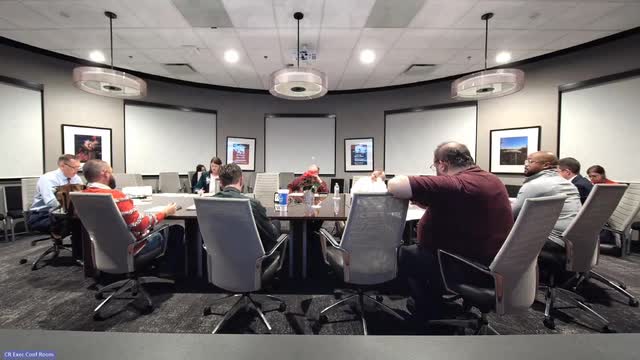Hutto council reviews proposed changes to hotel-occupancy-tax policy, weighs reserve rules and short-term-rental reporting
Get AI-powered insights, summaries, and transcripts
Subscribe
Summary
At a Dec. 19 work session, Hutto City Council discussed amendments to the city's hotel occupancy tax (HOT) use policy, including timing of the application window, whether city projects must use the application, reserving a percentage of HOT for a large capital project, and adding short-term rentals to taxable reporting.
Hutto City Council on Dec. 19 reviewed proposed revisions to the city's hotel-occupancy-tax (HOT) funds use policy, focusing on the application and award timing, whether city-sponsored projects should be exempt from the application window, options for reserving a portion of HOT for a major capital project, and whether short-term rentals should be explicitly included in the tax policy.
The discussion came during a work session item described as "discussion of proposed amendments to the hotel occupancy tax, hot funds use policy," when staff sought council guidance on several open questions before returning a revised policy and answers to legal and finance questions. The council did not take any formal votes during the session.
The proposed administrative changes under consideration included moving the application window to Feb. 1'March 30 to align awards with budget planning; clarifying that short-term rentals (rentals under 30 days) are taxable under state HOT rules and whether the city should pursue audits or collection agreements for platforms; and an amendment introduced Nov. 7 that would exempt city-sponsored or partner events from the application process so the council could consider funding them at any time.
Staff said the intent of the revised schedule is to align HOT awards with budget finalization while giving applicants time to secure other funding. The staff presentation proposed that applications be accepted in late winter/early spring so awards could be incorporated in the budget process; staff also proposed an internal completeness review period and a month-long review period for recommendations to council.
Councilors debated whether city projects should be exempt from the application window and whether those projects should nonetheless provide the same application information for transparency. Councilor Thompson said the council passes a budget and "if you want to do something, cut it somewhere else," arguing that the budget should stand and that city staff should plan projects in advance. Council Member Clark said exempting city projects from the application window made sense but suggested the council should still receive an outline of project impacts in the council packet. "I'd rather in our council packet, here's the whys we wanna do it. Here's the impacts we're gonna do it. And let's go," Clark said.
Several council members urged building more precise scoring criteria into the application so reviewers could compare tourism impact, feasibility and financial need across applicants. One councilor noted that tourism impact is the statutory qualifier for HOT funding: "It is, are you impacting tourism? Because if you're not impacting tourism, you don't get funds, period," a staff member said during the discussion. Participants asked for clearer numerical ranges for scoring (for example, what constitutes a high tourism impact versus a low one) and whether feasibility or financial need should be threshold criteria.
The council also discussed long-term strategy for HOT revenue. Multiple speakers proposed reserving a portion of HOT to fund a larger, lasting capital project such as meeting space or a community center rather than spending a large share on annual programming. Councilors referenced the current policy language that suggests the council will "make every effort to reserve 25% of collected hotel occupancy tax," and suggested options such as increasing the reserve to 30% until a target fund balance is reached or using HOT revenue for debt service on a named project. A council member noted that municipalities can sometimes obtain an additional local HOT rate (cited in discussion as a potential extra 2%) dedicated to financing a specific project; staff said legal review and an Attorney General opinion would be needed to confirm structure and feasibility.
Staff identified that the HOT policy dates to an original 2012 document with a 2014 update and a November 7, 2024 amendment (trail-of-lights funding was raised as an example of a recent amendment). Staff said they will review the policy language with finance and legal and return with a draft policy containing options and clarifying edits, including a digital application form and clearer scoring criteria.
Short-term rentals and compliance were also discussed. Councilors observed that state law treats short-term rentals (stays under 30 days) as subject to HOT, and the council asked staff to verify whether short-term-rental platforms are currently remitting tax to the city or state and whether the city should pursue audits or third-party collection agreements. Staff said the policy language currently does not explicitly list short-term rentals and that clarifying language and any ordinance changes necessary would be considered.
Several councilors debated how applications should be reviewed and by whom. Options included a council subcommittee, staff-led review, involvement of Economic Development Corporation (EDC) members, or using the outside-agency funding review panel as a model. Some councilors cautioned that including elected members in the review creates the perception of political influence; others supported including EDC members for subject-matter input while keeping final funding decisions with council.
No final policy decision or vote was made at the work session. Staff said they would return the draft amended policy (with legal and finance analyses and suggested scoring criteria) at a later meeting so council could adopt a timeline for the first application window and any procedural changes.
Ending: Staff will return a revised HOT policy and supporting memos addressing legal questions, reserve options, short-term-rental treatment, application scoring details and recommended review structure for council consideration at a future meeting.
